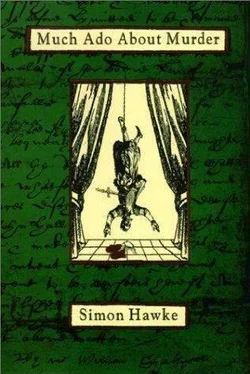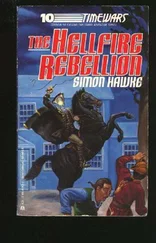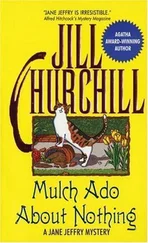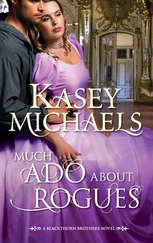Simon Hawke - Much Ado About Murder
Здесь есть возможность читать онлайн «Simon Hawke - Much Ado About Murder» весь текст электронной книги совершенно бесплатно (целиком полную версию без сокращений). В некоторых случаях можно слушать аудио, скачать через торрент в формате fb2 и присутствует краткое содержание. Жанр: Исторический детектив, на английском языке. Описание произведения, (предисловие) а так же отзывы посетителей доступны на портале библиотеки ЛибКат.
- Название:Much Ado About Murder
- Автор:
- Жанр:
- Год:неизвестен
- ISBN:нет данных
- Рейтинг книги:5 / 5. Голосов: 1
-
Избранное:Добавить в избранное
- Отзывы:
-
Ваша оценка:
- 100
- 1
- 2
- 3
- 4
- 5
Much Ado About Murder: краткое содержание, описание и аннотация
Предлагаем к чтению аннотацию, описание, краткое содержание или предисловие (зависит от того, что написал сам автор книги «Much Ado About Murder»). Если вы не нашли необходимую информацию о книге — напишите в комментариях, мы постараемся отыскать её.
Much Ado About Murder — читать онлайн бесплатно полную книгу (весь текст) целиком
Ниже представлен текст книги, разбитый по страницам. Система сохранения места последней прочитанной страницы, позволяет с удобством читать онлайн бесплатно книгу «Much Ado About Murder», без необходимости каждый раз заново искать на чём Вы остановились. Поставьте закладку, и сможете в любой момент перейти на страницу, на которой закончили чтение.
Интервал:
Закладка:
“And what would I have to do with foolish young apprentices who knew no better than to leave their trades and go running off to war?” she asked.
“Well, far be it from me to know, Mistress Molly Beatrice O’Flannery,” said Shakespeare, “save that ‘twould seem I had heard in passing somewhere that you once had a deal to do with this particular apprentice… or former apprentice, I should say, as he has by all reports proven himself a brave and stalwart soldier, having much distinguished himself in feats of arms on foreign soil.”
“Good Lord! You are not speaking of Ben Dickens?” asked Will Kemp.
“Indeed, I do believe that was his name,” Shakespeare replied.
“What, our own Ben Dickens?” asked John Fleming.
“The very same, by his own report,” Shakespeare responded.
“You saw him, then?” said Speed. “You spoke with him?”
“I did, indeed, both see and speak with him,” said Shakespeare, “and you may know he did inquire after all of you, as well, and did bid me give you all his warm regard and, furthermore, this message: that he would come here and call upon you all this very evening.”
“Oh, now that is good news, indeed!” said Burbage.
“By God, that calls for another round of drinks!” said Speed. And then he glanced uncertainly at Shakespeare, all too mindful of his own empty purse. “That is, of course, assuming your good graces…”
“Oh, by all means, Bobby, have another round on me,” said Shakespeare airily, with a wave of his hand.
“Your newfound wealth shall not last out the night, at this rate,” Smythe cautioned him.
“Oh, ‘tis a weighty purse, and there is always more where that came from,” said Shakespeare, lightly.
“Just the same,” said Burbage, “we would be poor companions if we drank up all your earnings. ‘Tis good news, indeed, that the playhouses may soon be open once again, but have a care, Will. We do not yet know how soon that ‘soon’ shall be. Unless, that is, you happen to be privy to more knowledge than you have thus far shared with us.”
“In good time, Dick, in good time,” said Shakespeare. “For now, let the lads enjoy themselves. ‘Tis money well spent if it gladdens them, for then it gladdens me. I shall not begrudge them so much as a farthing.”
“Who is this Ben Dickens of whom everyone is speaking?” Smythe asked, puzzled. “I do not recall the name.”
“That is because you have never met him, Tuck,” Burbage replied. “He was with the company some years ago, when he was just a lad. Fleming took him on as an apprentice, to play the women’s parts, but he left us before you and Will came to join the company.”
“Do you mean to tell me that he left the players to become an armorer’s apprentice?” Smythe asked, with surprise.
Burbage chuckled. “You know something of the armorer’s trade, so you are thinking, no doubt, that Ben Dickens left an easy trade for one much more laborious. However, in truth, his heart was never in the player’s life. He was a real roaring boy, and playing at adventure on the stage never truly suited him when there was genuine adventure to be had. Besides, his voice changed early on and grew much too deep to play the female roles, though he was still too small to play the adult male parts. We would still have kept him on, of course, for we all loved him well and he would have grown into his voice soon, but then he found an armorer to take him on as an apprentice and so he chose to leave us, thinking to learn the trade of arms from the crafting to the plying of them.”
“We parted on the very best of terms,” added John Fleming, “and he still came to see us now and then, whenever he could spare the time, but then one day his master fell to a palsy and the shop was closed, so Ben went off to war with some of the soldiers he had met.”
“How did you happen upon him?” asked Burbage, turning to Shakespeare.
“He was part of the company at dinner with the gentleman who was kind enough to give me this,” Shakespeare replied, picking up his purse and tossing it lightly in his palm to hear it jingle before putting it away. “When he discovered that I was a player with the Queen’s Men, he introduced himself and greeted me with such warmth and affection as to win me over on the instant.”
“Aye, that’s Ben,” said Fleming, smiling. “He faces all the world with open heart and countenance. I have never met a man who from the start could not perceive his merits.”
“Nor has Ben Dickens ever met a man to whom he would not recite them,” Molly added wryly, as she swept by with several tankards.
“Nay, Molly, you do him an injustice,” said Will Kemp. “Ben was ever modest to a fault.”
“If he were modest to a fault, then he would find it needful to abandon modesty, the better to be faultless,” she tossed back over her shoulder.
“He never held himself to be so,” Kemp replied. “Why blow your own horn when you can have heralds trumpet all your fanfares for you?” Molly said, as she served some patrons at another table. “Ben gathers friends who extol his virtues the way a vain woman surrounds herself with mirrors, the better to bask in her reflections. Much as you all seem to love him, I vouchsafe he loves himself the better.”
“ ‘Twould seem as if you have some grievances against him, Molly,” Smythe said. “Has the man done you some injury?”
“Oh, no injury was done to me, though one might think his own vaunted opinion of himself effects an injury to good prudence,” she replied, as she retrieved some empty tankards and wiped off a table. “As for grievances against Ben Dickens, I have none. Why should I? What is Ben Dickens to me? I pay no more heed to him that I would to the wind which constitutes the greater part of him.”
“The lady doth protest too much, methinks,” said Shakespeare, in an aside to the others. “If she truly cared so little for Ben Dickens, ‘twould seem she would not speak so much of him. Or, perhaps, so ill.”
“She does seem to dislike the fellow,” Smythe said.
“You must not mistake her, though,” Burbage replied. “There always was a kind of merry war betwixt them, and they never met without some skirmish of wit between them. In truth, I do believe that Ben and Molly share a more than passing fancy, though neither would admit to so much as a brass farthing’s worth of fondness for the other.”
“Well, disdain is oft the obverse of the coin of fondness,” Shakespeare said. “And skirmishes of wit can oft preclude the larger and more earnest battle of the sexes, known as marriage.”
“I like that,” Burbage said. “Skirmishes of wit precluding the battle of the sexes. Perhaps we can use that line somewhere.”
“ ‘Tis yours, my dear Burbage,” said Shakespeare, with a magnanimous gesture. “Make what use of it you will, so long as you put to good usage.”
“So then, who else was present, Will, ‘mongst this distinguished company where you met our Ben?” asked Fleming.
“Well, now let me put memory to the test,” said Shakespeare, frowning. “There were several in the company, along with the gentleman I mentioned, among them a stout, older, balding fellow called Master Peters by the others, by which tide and by whose fine apparel and accoutrements I would infer that he must be a guildsman of some standing in his company, though which company that was I cannot say.”
“Oh, well, I can tell you that,” interjected Burbage. “He is a master in the company of goldsmiths. He likely has more journeymen and apprentices in service at his shop than any other hammerman in Cheapside. He comes often to our theatre, where he takes a box up in the galleries and entertains his friends. Word has it he may soon be made a peer, for he surely has the means and the connections to move up. You were civil to him, I trust?” “I am civil to the world, Dick,” Shakespeare replied. “And as Master Peters was civil in regard to me, so was I to him. Never fear, I did not embarrass your fine patron, nor did he give me cause to. He had with him a handsome young man by the name of Corwin, whom I might have taken for his son, but for the lack of any resemblance between them, for his manner toward the lad was very much that of a father or perhaps an uncle.”
Читать дальшеИнтервал:
Закладка:
Похожие книги на «Much Ado About Murder»
Представляем Вашему вниманию похожие книги на «Much Ado About Murder» списком для выбора. Мы отобрали схожую по названию и смыслу литературу в надежде предоставить читателям больше вариантов отыскать новые, интересные, ещё непрочитанные произведения.
Обсуждение, отзывы о книге «Much Ado About Murder» и просто собственные мнения читателей. Оставьте ваши комментарии, напишите, что Вы думаете о произведении, его смысле или главных героях. Укажите что конкретно понравилось, а что нет, и почему Вы так считаете.












